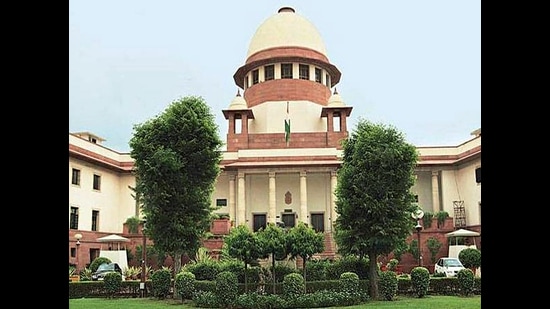Supreme Court commutes death sentence to allow rape convict’s reformation
The convict was sentenced to death by a trial court in Seoni, Madhya Pradesh for causing murder (Section 302) although he was charged and convicted under various provisions of rape (Section 376) of the IPC as well as relevant sections of the POCSO.
Stating that one of the tenets of “restorative justice” was to provide opportunities to an offender to become a “socially useful individual”, the Supreme Court has commuted the death sentence of a rape-murder convict to a 20-year jail term.

Hearing the appeal of a man convicted of raping and murdering a four-year-old in 2013 in Madhya Pradesh, a three-judge bench headed by Justice Uday Umesh Lalit said on Tuesday: “One of the basic principles of restorative justice as developed by this Court over the years, also is to give an opportunity to the offender to repair the damage caused, and to become a socially useful individual, when he is released from the jail.”
Taking into consideration the brutal nature of the crime, the bench was open to the convict’s death sentence being commuted to a life sentence. “The maximum punishment prescribed may not always be the determinative factor for repairing the crippled psyche of the offender,” the bench, also comprising justices S Ravindra Bhat and Bela M Trivedi said.
The convict was sentenced to death by a trial court in Seoni, Madhya Pradesh for causing murder (Section 302) although he was charged and convicted under various provisions of rape (Section 376) of the Indian Penal Code as well as relevant sections of the Protection of Children from Sexual Offences Act, 2012 (POCSO). The Madhya Pradesh high court had upheld the death penalty by its order of July 15, 2014, while it acquitted another person tried with him for the same offences.
Though the top court found the appellant convict guilty of all charges, on the question of sentencing, the bench was guided by the words of famous Irish poet and author Oscar Wilde, who in one of his books, had said, “The only difference between the saint and the sinner is that every saint has a past and every sinner has a future.”
Justice Trivedi, writing the judgment for the bench said, “Hence, while balancing the scales of retributive justice and restorative justice, we deem it appropriate to impose upon the appellant-accused, the sentence of imprisonment for a period of twenty years, instead of imprisonment for the remainder of his natural life for the offence under section 376A IPC.”
Section 376A carries a minimum punishment of 20 years rigorous imprisonment for a person who in the course of committing rape inflicts such injuries that causes death of the victim or leaves her in a permanent vegetative state.
The court had engaged senior advocate BH Marlapalle to argue for the convict. The appelant had submitted that there was great media pressure on the investigating agency following the incident and the investigation was carried out hurriedly. He claimed that the accused was denied fair trial as no advocate was ready to appear for the accused and even the trial of the case was fast-tracked.
About the April 2013 rape-murder, the court said: “One of the most barbaric and ugly human faces have surfaced. A tiny bud like girl was smothered by the appellant before she could blossom in this world. The monstrous acts of the appellant suffocated the victim to such an extent that she had no option but to leave this world.”
The cause of death was stated to be “bronchopheumonia and cerebral hypoxia, which was caused by smothering the nose and mouth.”
In cases involving heinous crimes, the bench said, “The society at large would also be an important stakeholder. Interest of the society, which acts through the State and prosecuting agencies, should also not be treated with disdain. Therefore, the court conducting the trial/appeal is not only obliged to protect the rights of the accused but also the rights of the victim, and the interest of the society at large.”
Guided by this thought, the bench said that the trial court was not wrong to expedite the trial as the right to speedy justice applies to the victim as well. “Hence, considering the gravity and seriousness of the crime, if the trial is expedited by the Court, it could not to be said that such trial was not fair to the accused,” the bench added.
Marlapalle pointed out that in the facts of the case, there were settled judgments of the Court which held that this incident will not fall in the “rarest of the rare case” meriting death penalty. But the bench observed, “It was duly proved that while committing the barbaric acts of rape and sexual assault on the young child-victim aged about four years, the appellant-accused had inflicted bodily injuries as mentioned in the post-mortem report which had caused her death.”
According tothe prosecution, the accused had fled after the rape-murder and was arrested from his village in Bihar (when?). He was last seen with the victim and the DNA obtained from hair found at the crime scene matched with the DNA profile obtained from the appellant’s blood samples.
Even the state had submitted during its arguments in the top court that the lower courts had appreciated the evidence and come to the conclusion that the accused was guilty.






